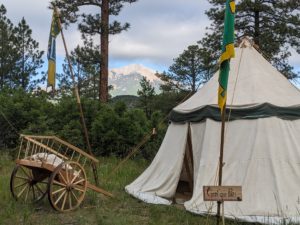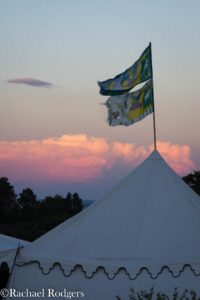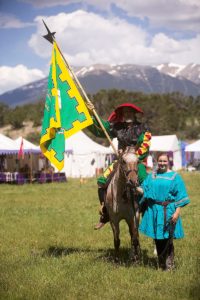What exactly is Kingdom Arts and Sciences Tourney?
Kingdom Arts and Sciences Competition is the premiere arts and sciences tournament to determine and highlight the leaders of arts and sciences in our kingdom. Think of it as the Olympics of the Kingdom’s arts and sciences community. Currently you don’t have to qualify through any other competitions. This is the place where our artisans bring the best that the
kingdom has to offer through their awesome documented projects.
You are welcome to enter a project to gain competition experience by having it judged and receiving feedback without wanting to become Kingdom Arts and Sciences Champion.
Not everyone who enters Kingdom Arts and Sciences Competition is aiming to compete for the Kingdom Champion and that’s okay.
How does someone compete for Kingdom Arts and Sciences Champion?
Entrants who would like to compete for the title of Kingdom Arts and Sciences Champion must produce three projects that encompass the skills found in a minimum of two different categories. These projects must also be entered with documentation to support them.
What does the Kingdom Arts and Sciences Champion do?
The Kingdom Arts and Sciences Champion is encouraged to be a role model and supporter of the arts and sciences community in our kingdom. Currently how the champion chooses to do that is up to the individual. The title does come with a medallion and a baldric that the champion can wear during their time. The duration of time for being champion is one year
Who can enter?
Anyone who is a paid member of the SCA and is a populace member of the Kingdom of the Outlands can enter. Again you currently do not have to qualify by having a certain award or winning a prior competition. Judging is meant to be constructive and conducive feedback on how to improve your work and help you grow in your art.
What is the process?
First decide what you would like to enter. Next you will submit your information on the entry form that will be available on the kingdom arts and sciences website. Next, a very helpful tip is to gather research for your project before you start working! It is harder to try and find documentation for something you have already created than to find documentation to help you craft something according to your research. You will be encouraged to submit your documentation ahead of time (via email) so that your judges can read it before the competition. This can help facilitate a thoughtful and well informed conversation about your entry.
What is documentation?
Documentation tells your judges the who, what, where, why, when and how of your project. Documentation gives you the opportunity to tell others, including your judges, all that you have learned about the project you have chosen to bring for competition. Artisans will want to include information about materials, design choices you have made and why as well as include the tools
you used. Photos are very welcome. You are expected to have your sources listed in a way that someone is able to find your sources with the information you provided. While other competitions may not require documentation or may ask for minimal documentation on a 3×5 index card, documentation for Kingdom Arts and Sciences is expected to be written out and presented to the best of your ability.
What should I expect on the day of the tourney?
Try to arrive at the event with plenty of time to check in, set up your project and display, and get comfortable. You will need to check in both at the gate and then at the entrant’s table. You will be assigned to a space at a table and you will need to go and set up before the judging starts. Go to your table and set up. You will be informed what your judging time frame is when your judges will arrive at your table to speak with you. A panel of 2 to 3 judges will look at your project,
overview your documentation and then ask you to explain your project. The judges will then ask further questions about your project, process and next steps. Judges will be taking notes and grading your project with a rubric that is specific to the type your entry fits into. Judging timeframes are for approximately 50 minutes after which your judges will leave and finish
recording their observations.
Your judges will submit their completed judging sheets to the Kingdom Arts and Sciences Minister to be tallied and the scores will be averaged among the judges. At the end of the day, division winners will be announced as well as the Kingdom Arts and Sciences Champion will be announced.
During the day, people from the populace will be encouraged to come by and see what you have done and maybe read your documentation. It’s nice to have extra documentation or summaries of your documentation along with contact information for anyone who is really interested in your project. You should also have time to get up and look at the other entries as well.
What should a good display look like?
Your project display is very personal. Expect to have about 36” of space to display your project as well as the possibility of a small amount of floor space for larger needs such as mannequins ect. A cloth to cover your table makes things look more professional. Your display should highlight your project as well as your personality. A display board is not required or necessary but some people like to use them. You may want to have your raw materials, tools, steps of your project, photos, and books you relied on. The most important parts of your display are you and your project.
What should I expect in judging?
You should expect your judges to be interested in your project, kind and encouraging. They will ask you about your project and documentation. They may explain to you why they are grading your project as they are. They should give ideas and suggestions on how to improve and resources to go for more information. It can be a tense time for entrants because you put so much of yourself into a project, but try to relax and engage with your judges. A good judging feels more like a conversation than an evaluation. Both judges and entrants should learn a little something.
Do not expect a perfect score! The judging rubrics are meant to allow for people to score awesome in some areas and not as well in areas that are more difficult for that person, but get the best score possible. It’s very common for someone to have a great score on craftsmanship and have a lower score on documentation. Judging should be a time for feedback and growth, not a time to feel bad about the areas that were difficult for you.
Also remember that your judges are volunteers and while we try to find judges that know the area of art or science that you are entering, we may not be able to find a perfect match. Some judges may need more education on your project than others.
The Kingdom Minister of Arts and Sciences and their deputies are all available if you have any questions or concerns about the process or during the competition. We are here to help and serve our artisan community so if you need or want assistance, reach out.



